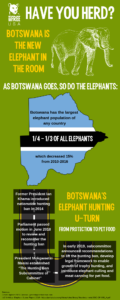Born Free USA strongly opposes the proposed changes to elephant management in Botswana, in particular the recommendations that the ban on elephant hunting be lifted and that elephant culling be instituted in the country. Not only would killing elephants contribute to the decline of the species, it could also damage the nation’s existing wildlife tourism industry.

Since 1979, African elephants have lost over 50% of their range and, today, there are only around 415,000 elephants remaining the wild in Africa, making Botswana’s approximately 130,000 elephants a large portion of the total population. Habitat loss and poaching are major causes of population decline, and allowing the killing of elephants for sport or in the name of “species management” would only exacerbate these issues by further shrinking elephant numbers. Indeed, in September 2018, the wildlife charity Elephants Without Borders provided photographic evidence that indicated as many as 90 elephants had been slaughtered for their tusks in Botswana over the previous two months. This suggests that poaching may be an emerging problem in Botswana that will put new pressures on the country’s elephants, which can only worsen with the introduction of trophy hunting. What is more, trophy hunters tend to target the largest and healthiest male animals, as their parts – such as tusks, heads, and feet – make the most “impressive” trophies. Removing the largest and healthiest male animals from the breeding population can only serve to weaken the species over time.
Allowing trophy hunting in the country may also negatively impact Botswana’s thriving wildlife tourism industry by deterring eco-friendly tourists from visiting the country. While hunting proponents claim that trophy hunting significantly contributes to local economies, in truth, studies have shown that trophy hunting typically accounts for only 1 – 2% of a country’s tourist industry revenues. Additionally, trophy hunting companies only contribute around 3% of their revenue to local economic development, meaning that these activities typically provide only a very small economic boost. By contrast, eco-friendly tourism has proven to be far more lucrative. According to the World Travel and Tourism Council, travel and tourism to Botswana in 2016 generated approximately $1.6 billion USD, or 10.9% of the country’s GDP, and was responsible for 7.1% of total employment. About half of this was generated through overseas tourists visiting the country, with wildlife and ecotourism contributing significantly to these numbers. And, while it typically costs around $50,000 for a hunter to kill an elephant, studies have shown that that same elephant, if allowed to live, could bring in more than $1.6 million in tourist revenue over the course of its life. Allowing trophy hunting in Botswana will not generate a great deal of economic development but, because trophy hunting is so unpopular, it may deter eco-friendly tourists from visiting the country by tarnishing Botswana’s strong wildlife conservation reputation.
Born Free USA is sensitive to concerns over growing human/elephant conflict in rural Botswana, the justification for these proposed changes to elephant management in the country. However, we urge Botswana to investigate the possibility of working with neighboring nations to protect elephant populations and secure the animals’ migratory routes across borders and of relocating elephants to less populous areas, alongside other non-lethal methods of conflict mitigation.
Born Free USA signed onto an international letter addressing President Masisi of Botswana to uphold the ban on trophy hunting and to not allow regular elephant culling.